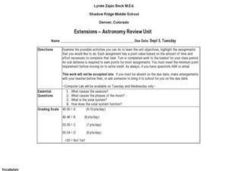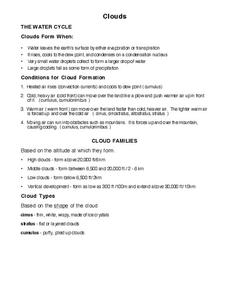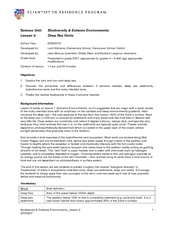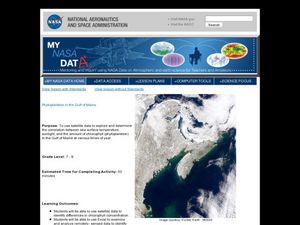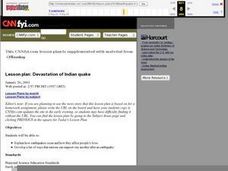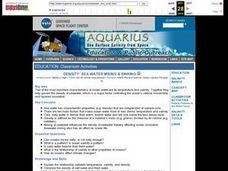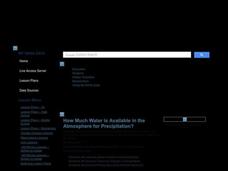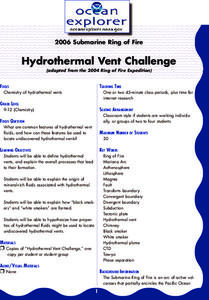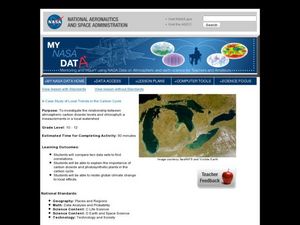Curated OER
Keep It Cool
Students complete a science experiment to study insulation, heat transfer, and permafrost. In this permafrost study lesson, students design and test a soda insulator. Students graph their class data and discuss the results. Students...
Curated OER
Determining the Percolation Rate of Soil
Students discover how water moves through different types of soils. In groups, they use the same sample from a previous activity and empty it into a milk carton in which they have layered with cheesecloth to determine the percolation...
Curated OER
The Rain Maker
Second graders work in small groups with a cup each of several materials. Students layer the gravel, sand, and water into a resealable bag. They draw a picture of this bag in their water journal. Students place their sealed bags in a...
Curated OER
Extensions - Astronomy Review Unit
Students participate in a review unit in Astronomy using the Layered Curriculum. This allows them to take charge of the type of assessment that is given. The method also allows better differentiation of instruction to occur.
Curated OER
Clouds
In this science worksheet, students look for the meaning of the water cycle and its relation to the formation of clouds. They read the information about the different types of clouds.
Curated OER
Deep Sea Vents
Students study the vent and non vent deep sea and see the differences in habitats. In this investigative lesson plan students complete a worksheet and work in groups.
Curated OER
Trouble in the Troposphere
Pupils Use data sets from MY NASA DATA to produce graphs comparing monthly and yearly ozone averages of several U.S. cities. They analyze and evaluate the data and predict trends based on the data. In addition, they discuss and describe...
Curated OER
Layers of Time in the Earth
Students are introduced to the concept of stratification as a historical and geological process. Students will read about the Richard Beene archaeological site, which lies near San Antonio, Texas on the Medina River, and watch a short...
Curated OER
Soil Composition
Learners examine soil. In this soil composition lesson students participate in soil sedimentation and filtration activities. The learners discuss what non-living and living things are in soil and why it is so important.
Curated OER
Physical Science: Dying for a Tan?
Students assess how much harm UV radiation can have on your skin and how much protection is provided by sunblock, sunglasses and clothing. They experiment with UV index numbers and the amount of exposure risk of skin damage for any given...
Curated OER
Earth & Space Science: Holding it Together
Students estimate how many drops of water can fit onto the surface of a penny and then test their hypothesis to find out. They also experiment with bubbles.
Curated OER
Greenhouse Effect: Pop Bottle Experiment
Young scholars explore global warming by conducting a weather experiment. In this greenhouse gas lesson, students define the greenhouse effect and the impact on our ozone layer. Young scholars utilize a soda pop bottle, floodlight bulb,...
Curated OER
Trees and Erosion
Students examine the connection between trees and erosion. In this erosion activity students experiment with the effects of rain on a hillside. Students investigate the number of trees and the amount of erosion.
Curated OER
Phytoplankton in the Gulf of Maine
Students use satellite data to see the correlation between sea temperature and sunlight in the Gulf of Maine. In this phytoplankton lesson students use Excel to analyze data.
Curated OER
Liquid Rainbow
Students develop their own techniques for drawing a small sample of solutions into a straw. They hypothesize ways to increase the density of water, and discuss how salt-free rainwater tends to float on top of salty seawater.
Curated OER
Devastation of Indian Quake
Students read an online article at CNNfyi.com to determine what happened in India after an earthquake. They determine the magnitude of this earthquake and address the issue of relief efforts from other countries.
Curated OER
Teaching About Plate Tectonics and Faulting Using Foam Models
Young scientists learn about plate tectonics and the three different types of faults (normal, reverse, and strike-slip) using foam models. The activity also covers common types of locations where these faults are found.
Curated OER
Sea Water Mixing and Sinking
Middle schoolers investigate the role of temperature and salinity in determining seawater density. They use a Temperature-Salinity Diagram to examine the effects of mixing on density.
Curated OER
Rock My World
Students conduct a hands-on experiment designed to demonstrate how continents and oceans formed and why the manner of formation is relevant to a study of volcanoes.
Curated OER
Building for the Big One
Students build and test structures that can best withstand earthquakes. They create their structures from playdough, cornstarch, grape-nuts and popsicle sticks and place their structures on a "shake table."
Curated OER
How Much Water is Available in the Atmosphere for Precipitation?
Students explore the relationship between the amount of water in the atmosphere available for precipitation and the actual precipitation observed by satellite. They examine seasonal changes in precipitation. They practice using Internet...
Polar Bears International
Top of the World
Learn about polar bears and the Arctic circle with a lesson about the countries and conditions of the region. After examining how the area differs from Antarctica, kids explore climates, animals, and geographical position...
Curated OER
Hydrothermal Vent Challenge
Give our ocean voyagers the "Hydrothermal Vent Challenge!" It is a worksheet that guides them through an exploration of hydrothermal vents and the chemical reactions that occur when lava meets seawater. Using a collection of websites,...
Curated OER
Case Study of Local Trends in the Carbon Cycle
Students examine the relationship between chlorophyll and carbon dioxide in the atmosphere. In this investigative lesson students study the local effects of climate change.
Other popular searches
- Science Earth Layers
- Science Earth's Layers
- Earth Science Layers of Earth
- Earth Science Earth's Layers
- Earth Science Earth Layer
- Science Earths Layers





